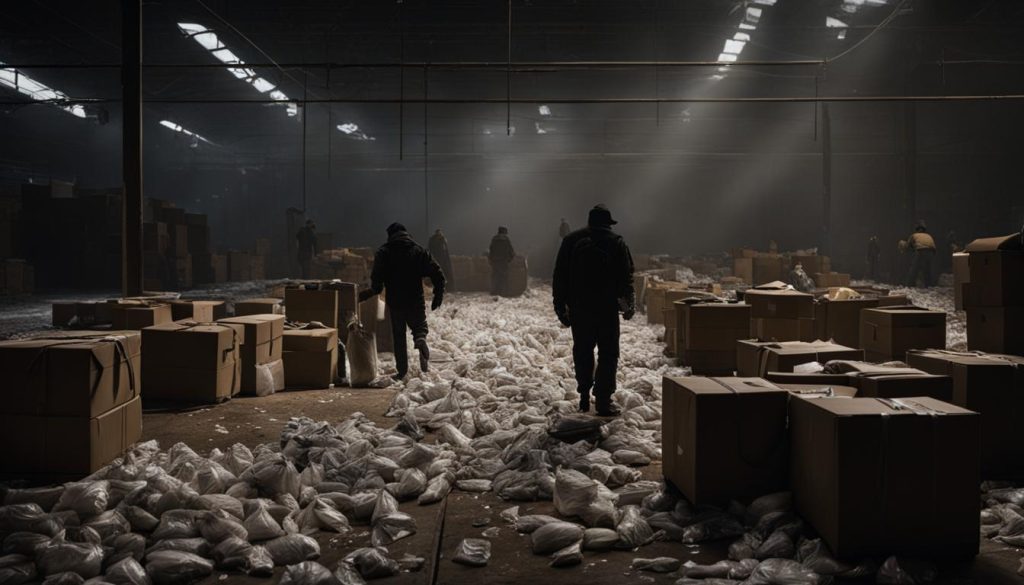Did you know that drug offences in Canada can result in severe penalties, including imprisonment for life? The enforcement and consequences of drug crimes have significant implications for individuals and society as a whole.
Drug offences encompass a range of illegal activities, including drug possession, trafficking, and production. The Controlled Drugs and Substances Act (CDSA) sets out the legislation governing these offences and provides guidelines for Crown counsel in prosecuting drug-related cases.
In this article, we will delve into the various aspects of drug offences in Canada, including the impact of mandatory minimum penalties, the types of drug offences, the penalties associated with drug crimes, the influence of marijuana legalization, and the importance of seeking legal help if facing drug charges.
Key Takeaways:
- Drug offences in Canada can result in severe penalties, including imprisonment for life.
- The Controlled Drugs and Substances Act (CDSA) governs drug-related offences and provides guidelines for prosecution.
- Drug offences include possession, trafficking, and production of illegal substances.
- The penalties for drug offences vary depending on the nature and circumstances of the charges.
- Marijuana legalization in Canada has specific rules and regulations that must be followed to avoid drug charges.
Impact of MMPs on Prosecutions
With the implementation of mandatory minimum penalties (MMPs), Crown counsel faces new challenges in plea negotiations while upholding the MMP regime. Defense counsel may exert increased pressure to negotiate plea agreements that avoid the imposition of an MMP. However, it is essential for Crown counsel not to undermine the purpose of mandatory minimum penalties during these negotiations.
Crown counsel plays a crucial role in presenting all relevant provable facts to the court during plea negotiations. As per the guidelines provided by the Public Prosecution Service of Canada, Crown counsel is required to prosecute offences involving facts that support the imposition of an MMP and are provable. This places the onus on Crown counsel to prioritize the presentation of provable evidence.
In exceptional circumstances where seeking the consent of the Chief Federal Prosecutor (CFP) beforehand is not feasible, Crown counsel may have discretion in not prosecuting offences that meet the criteria for an MMP. However, plea agreements to lesser offences or staying/withdrawing charges necessitate the consent of the CFP or delegate.
By adhering to these guidelines, Crown counsel can maintain the integrity of the MMP regime while fulfilling their duty to the court and the administration of justice.
Example Case:
Let’s consider a hypothetical case where a defendant is charged with multiple drug offences. The Crown counsel is aware that the defendant’s charges meet the threshold for mandatory minimum penalties due to the aggravating factors involved. During plea negotiations, the defense counsel attempts to persuade the Crown counsel to agree to a plea agreement that would avoid the imposition of an MMP.
In this situation, Crown counsel must carefully evaluate the evidence and the facts supporting the MMP. They must present a strong case in court and ensure that all relevant provable facts are brought to the attention of the judge. By doing so, Crown counsel can uphold the principles of justice and effectively navigate the impact of MMPs on prosecutions.

| Key Points | Impact |
|---|---|
| Crown counsel faces increased pressure in plea negotiations. | Possible impact on the imposition of mandatory minimum penalties. |
| Plea agreements to lesser offences or staying/withdrawing charges require CFP’s consent. | Ensures adherence to the MMP regime. |
| Presenting all relevant provable facts is essential during plea negotiations. | Strengthens the case and upholds the principles of justice. |
Types of Drug Offences
Drug-related offences in Canada encompass various illegal activities, including drug trafficking, drug possession, drug production, drug importation, and drug exportation. These offences form the crux of the country’s efforts to combat illicit drug trade and protect public safety.

Drug trafficking involves the selling or transportation of drugs, contributing to the distribution and availability of controlled substances. It is a serious offence that carries severe penalties under Canadian law. On the other hand, drug possession refers to the act of having illegal substances in one’s possession. Possession charges can be filed for personal use or with the intent to distribute drugs.
Another common drug offence is drug production, which refers to the cultivation or manufacturing of drugs. This category includes activities such as growing marijuana plants or setting up methamphetamine laboratories. Importation and exportation of drugs involves the illegal transportation of controlled substances across national borders. These offences contribute to the global drug trade and pose significant challenges for Canadian law enforcement.
It is worth noting that certain aggravating factors can elevate drug offences to aggravated drug offences, which carry more severe penalties. These factors include involvement in organized crime, exploitation of children, use of violence or weapons in drug-related activities, and previous drug convictions.
Overview of Drug Offences in Canada
| Offence | Description |
|---|---|
| Drug Trafficking | Involves selling or transporting drugs |
| Drug Possession | Having illegal substances in one’s possession |
| Drug Production | Cultivating or manufacturing drugs |
| Drug Importation/Exportation | Bringing drugs into or out of the country |
Penalties for Drug Offences
Convictions for drug trafficking and other serious drug offences can result in severe penalties. The nature and circumstances of the charges determine the specific penalties, which may include:
- Large fines
- Probation
- Imprisonment for months or years
The maximum penalty for drug trafficking or possession of Schedule I drugs is life imprisonment. Penalties for cannabis offences are lower if lesser quantities are involved, but they can still result in significant consequences. It’s important to understand that even though recreational marijuana use is legal in Canada, there are certain rules and age restrictions that apply. Non-compliance with these rules can still lead to drug charges.
To illustrate the severity of the penalties for drug offences, here is a table showing the maximum penalties for different drug-related crimes:
As shown in the table, drug penalties can range from fines to life imprisonment, depending on the type of offence. It is essential to consult a criminal defense lawyer if you are facing drug charges. They can provide guidance on navigating the Canadian criminal legal system, protect your rights, and help craft the best possible legal strategy for your case. With their expertise, you can work towards the best possible outcome and minimize the impact of severe penalties.
Drug Offences and Marijuana Legalization
Although recreational marijuana use is legal in Canada, it is important to understand that drug charges can still result from its misuse. As with any controlled substance, specific regulations and laws govern the possession, purchase, and consumption of marijuana.
Canadian marijuana laws dictate the minimum legal age for purchasing and possessing marijuana, the designated places where it is legal to possess or purchase, and where individuals are legally permitted to smoke marijuana. These laws are in place to ensure responsible use and to mitigate any potential risks associated with marijuana consumption.
To avoid drug charges related to marijuana, it is crucial to familiarize yourself with the Canadian marijuana laws that apply to your jurisdiction. By staying informed and compliant, you can prevent unnecessary legal complications and protect your rights as a cannabis consumer.
If you find yourself facing marijuana drug charges, it is imperative to consult with a skilled criminal defense lawyer who specializes in drug-related offenses. A knowledgeable lawyer can provide expert guidance, explain your rights, and help you navigate the complex legal landscape surrounding drug charges in Canada.
Remember, understanding and adhering to Canadian marijuana laws is essential for a safe and legally sound cannabis experience. Prioritizing legal compliance can help you avoid potentially serious consequences and ensure your peace of mind when it comes to marijuana use.
Seeking Legal Help for Drug Charges
If you have been arrested for a drug-related offence in Canada, it is crucial to seek the guidance of an experienced criminal defence lawyer. Navigating the complex Canadian criminal legal system on your own can be overwhelming and have severe consequences.
A criminal defence lawyer will not only protect your rights but also craft the best possible legal strategy tailored to your case. They will work tirelessly towards achieving the best possible outcome for you. When facing drug-related charges, consulting with a skilled criminal defence lawyer is essential to ensure that your rights are upheld and that you receive a fair legal process.
At Kruse Law, our team of criminal defence lawyers in Ontario specializes in drug-related offences and has a deep understanding of the Canadian criminal legal system. With our extensive experience, we can provide you with the expert guidance and representation you need during this challenging time. Contacting a defence lawyer should be your priority after an arrest to safeguard your rights and protect yourself from overly harsh sentencing.